Originally, we were always milking cows here. My father Seamus was only five years old when he moved to this farm in Cappamore. They were milking dairy Shorthorns at the time and obviously got into the Holsteins and British Friesians then.
Alongside the dairy, he had commercial cattle and pedigree Simmentals. He got out of milking in 2008 after doing it all his life and focused fully on the beef at that stage.
I just loved doing it and grew up on it. Definitely, I always wanted to be farming anyway
I work off-farm and farm in partnership with my parents. I’m the youngest of four, I’ve a brother and two sisters. Traditionally, the son would always get the farm and that. I was lucky my brother didn’t have the interest in cattle. But that part of it never dawned on me, really. I just loved doing it and grew up on it. Definitely, I always wanted to be farming anyway.
I remember being about seven or eight and my mother asking me to sweep the kitchen floor, it wouldn’t take two minutes. I said: “Yeah, no problem”, but I ducked out the door there. I was above in the shed bedding bullocks and much happier doing it. It used to take about five small, square bales to bed them and I was as happy as a pig in muck.

Jennie Aherne exhibiting Towerhill Happy Harry. \ Alfie Shaw
Forget about getting a day off school if you were sick, but if you wanted to go to Kilmallock of a Monday morning to sell calves, that was educational. That was your only chance of getting a day off school.
Starting in Simmentals
I had no problem going out milking the cows or any of that side of things, but my passion was always the beef. I always loved my beef cattle. That’s ultimately why Dad got out of dairying too, he knew it wasn’t what I was getting into.
Basically, we ran a Simmental bull with the dairy herd. Dad got the notion of trying to breed his own bull. So he bought a heifer, bought a second heifer and the Simmental herd has grown from that.
We showed the Friesians a bit locally. It probably started out with Cappamore Show and supporting your local show. They were never pedigree registered, the dairies. We got showing the pedigree Simmentals in the late 80s.
Dad’s herd is Towerhill Simmentals and mine is Rubyjen Simmentals. I got a present for my 21st of a maiden heifer. Towerhill Rubyjen was her name. I started my herd in 2009 with her. I still have two of her daughters here now.
My father had bred her and she goes back to a cow that was named after myself, Jennie, and goes back to our very first Towerhill bred female, Samantha.
In 1995 we won our first All-Ireland. I wouldn’t remember the 1989 one, but 1995 at Ploughing, I remember
If you go back to 1989, our first big win was Towerhill Winston, he was only a nine-month-old bull. He won first prize inside in the Limerick Show. The next morning we had a Northern Ireland breeder in the field looking at him, wanting to buy him.
In 1995 we won our first All-Ireland. I wouldn’t remember the 1989 one, but 1995 at Ploughing, I remember. That was when Towerhill Edward won his All-Ireland. I gave the week up there.
I suppose my own first big win was 2009 with my first calf off Ruby. Axel won his All-Ireland there in Strokestown. He’d nine days out and he’d eight red rosettes out of it, so he did well for me.
Show days
Both Dad and I have been very involved in the Simmental Society over the years. I’m just finishing the first year of a two-year term as president at the moment. I’m enjoying it. With COVID-19, it’s been quiet.
I suppose the novelty of going to the shows with my own cattle wore off a bit, but I used to go and help friends, or even just go along to see the cattle. I’ve done a good bit of judging in recent years.
I do miss going out and seeing other people’s stock
In 2016 I judged at the Scottish National Simmental Show, which was a huge honour. Then last November I judged in Canada for their National Simmental Show, which was unbelievable. I don’t think that has fully sunk in yet.
With the shows cancelled, I do miss going out and seeing other people’s stock. You might think you have a good one at home in the field, but it’s not until you go out and see other people’s, that you know where you stand then.
We used to do about 10 shows in the summer, between what you’d show at and then you’d travel to a few more just to see them.
You’d get up some mornings going to a show, it could be five in the morning and it could be pouring rain. You’re saying: “Why am I doing this?” You could be chasing a calf around the field and they’re going everywhere but the gap.
Then when you get there, you’re grooming them up and you’re showing them; whether you’re first or last, the atmosphere is very enjoyable. It’s an addiction. It definitely is.
Originally, we were always milking cows here. My father Seamus was only five years old when he moved to this farm in Cappamore. They were milking dairy Shorthorns at the time and obviously got into the Holsteins and British Friesians then.
Alongside the dairy, he had commercial cattle and pedigree Simmentals. He got out of milking in 2008 after doing it all his life and focused fully on the beef at that stage.
I just loved doing it and grew up on it. Definitely, I always wanted to be farming anyway
I work off-farm and farm in partnership with my parents. I’m the youngest of four, I’ve a brother and two sisters. Traditionally, the son would always get the farm and that. I was lucky my brother didn’t have the interest in cattle. But that part of it never dawned on me, really. I just loved doing it and grew up on it. Definitely, I always wanted to be farming anyway.
I remember being about seven or eight and my mother asking me to sweep the kitchen floor, it wouldn’t take two minutes. I said: “Yeah, no problem”, but I ducked out the door there. I was above in the shed bedding bullocks and much happier doing it. It used to take about five small, square bales to bed them and I was as happy as a pig in muck.

Jennie Aherne exhibiting Towerhill Happy Harry. \ Alfie Shaw
Forget about getting a day off school if you were sick, but if you wanted to go to Kilmallock of a Monday morning to sell calves, that was educational. That was your only chance of getting a day off school.
Starting in Simmentals
I had no problem going out milking the cows or any of that side of things, but my passion was always the beef. I always loved my beef cattle. That’s ultimately why Dad got out of dairying too, he knew it wasn’t what I was getting into.
Basically, we ran a Simmental bull with the dairy herd. Dad got the notion of trying to breed his own bull. So he bought a heifer, bought a second heifer and the Simmental herd has grown from that.
We showed the Friesians a bit locally. It probably started out with Cappamore Show and supporting your local show. They were never pedigree registered, the dairies. We got showing the pedigree Simmentals in the late 80s.
Dad’s herd is Towerhill Simmentals and mine is Rubyjen Simmentals. I got a present for my 21st of a maiden heifer. Towerhill Rubyjen was her name. I started my herd in 2009 with her. I still have two of her daughters here now.
My father had bred her and she goes back to a cow that was named after myself, Jennie, and goes back to our very first Towerhill bred female, Samantha.
In 1995 we won our first All-Ireland. I wouldn’t remember the 1989 one, but 1995 at Ploughing, I remember
If you go back to 1989, our first big win was Towerhill Winston, he was only a nine-month-old bull. He won first prize inside in the Limerick Show. The next morning we had a Northern Ireland breeder in the field looking at him, wanting to buy him.
In 1995 we won our first All-Ireland. I wouldn’t remember the 1989 one, but 1995 at Ploughing, I remember. That was when Towerhill Edward won his All-Ireland. I gave the week up there.
I suppose my own first big win was 2009 with my first calf off Ruby. Axel won his All-Ireland there in Strokestown. He’d nine days out and he’d eight red rosettes out of it, so he did well for me.
Show days
Both Dad and I have been very involved in the Simmental Society over the years. I’m just finishing the first year of a two-year term as president at the moment. I’m enjoying it. With COVID-19, it’s been quiet.
I suppose the novelty of going to the shows with my own cattle wore off a bit, but I used to go and help friends, or even just go along to see the cattle. I’ve done a good bit of judging in recent years.
I do miss going out and seeing other people’s stock
In 2016 I judged at the Scottish National Simmental Show, which was a huge honour. Then last November I judged in Canada for their National Simmental Show, which was unbelievable. I don’t think that has fully sunk in yet.
With the shows cancelled, I do miss going out and seeing other people’s stock. You might think you have a good one at home in the field, but it’s not until you go out and see other people’s, that you know where you stand then.
We used to do about 10 shows in the summer, between what you’d show at and then you’d travel to a few more just to see them.
You’d get up some mornings going to a show, it could be five in the morning and it could be pouring rain. You’re saying: “Why am I doing this?” You could be chasing a calf around the field and they’re going everywhere but the gap.
Then when you get there, you’re grooming them up and you’re showing them; whether you’re first or last, the atmosphere is very enjoyable. It’s an addiction. It definitely is.





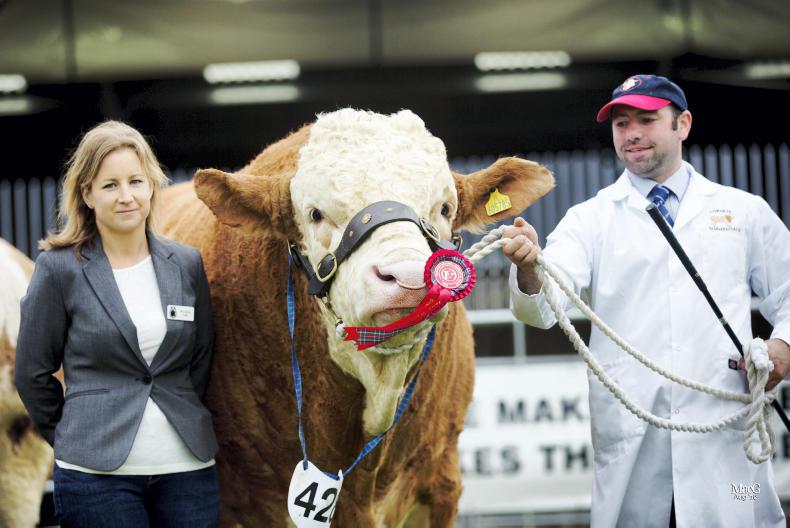
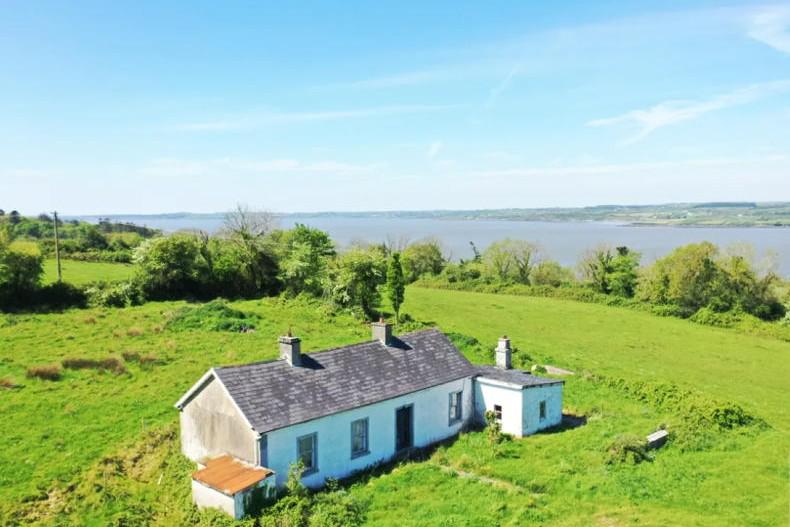
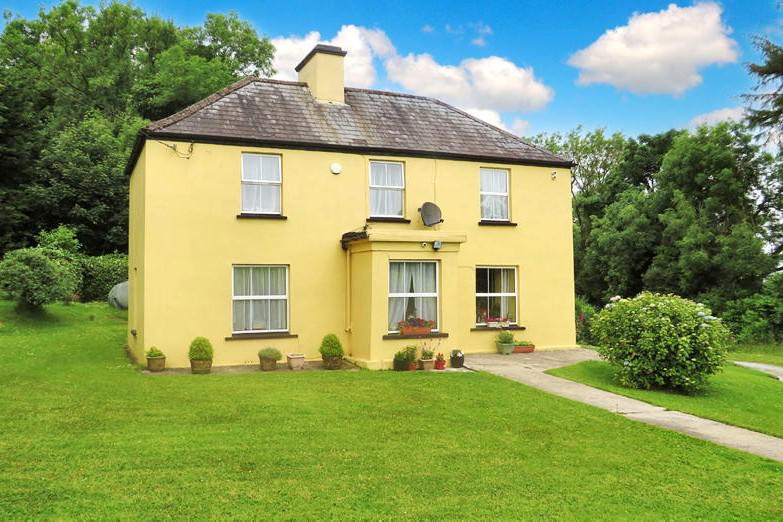
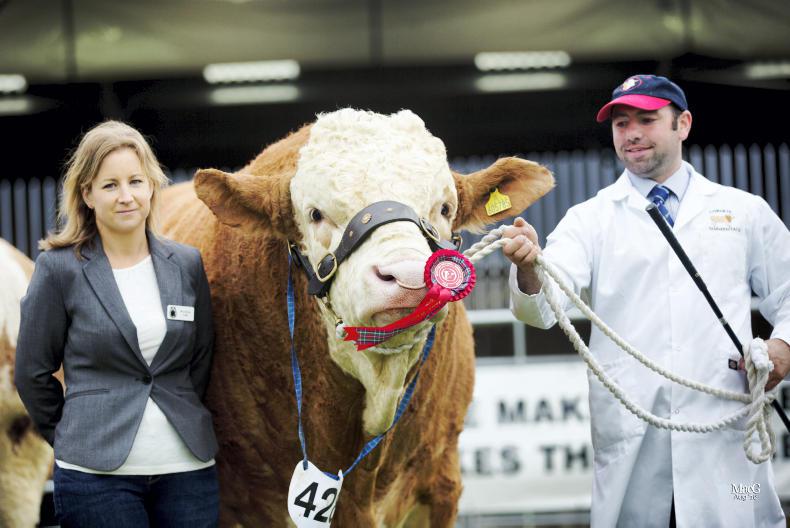
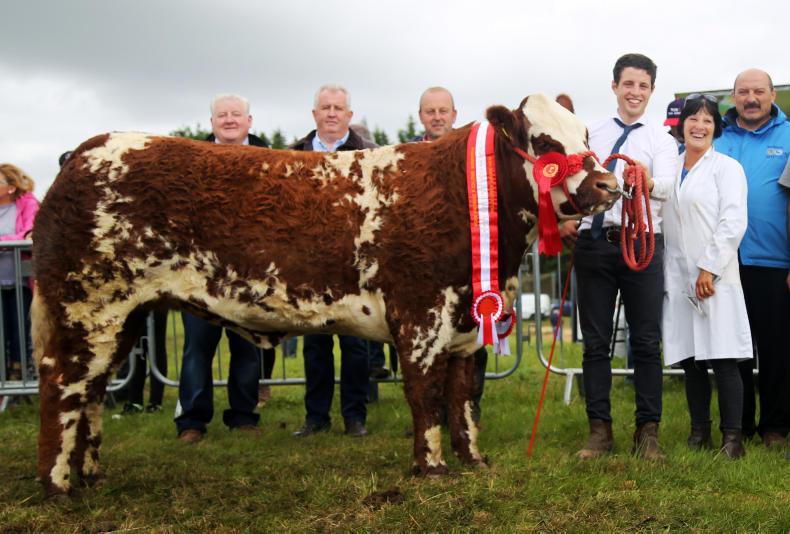
SHARING OPTIONS